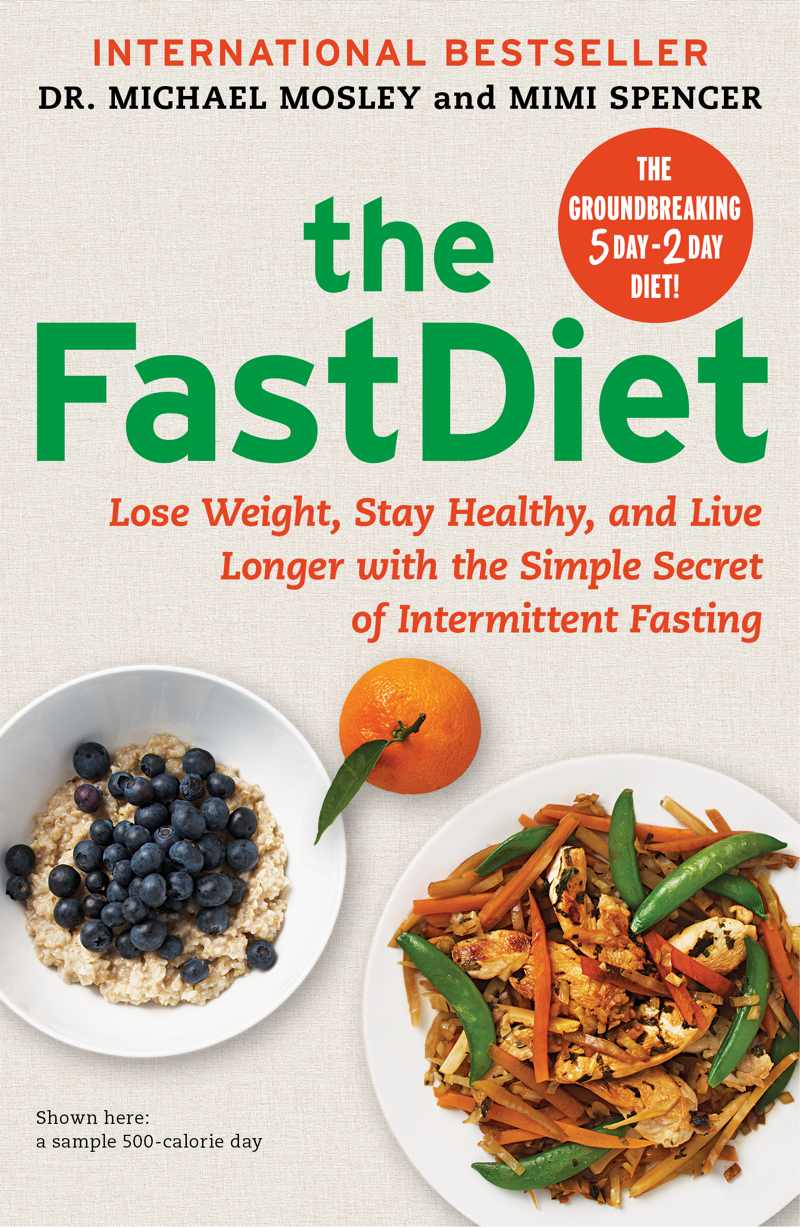Interested in losing weight and getting healthy while dieting only 2 days per week? That’s exactly what authors Michael Mosley and Mimi Spencer profess in the acclaimed (and controversial) intermittent fasting diet sweeping the globe, The Fast Diet – Lose Weight, Stay Healthy, and Live Longer With Intermittent Fasting. Susie T. of Fast Days Healing Days explains why this new variation of a very old dietary practice, might be just what the doctor ordered.

(click the book – buy it now on Amazon)
The Fast Diet by Michael Mosley and Mimi Spencer
The Fast Diet isn’t meant to be a “fast” diet—as in quick-weight-loss, rather, the “fast” in—The Fast Diet-Lose Weight, Stay Healthy, and Live Longer With Intermittent Fasting—represents a method of intermittent calorie restriction or “modified intermittent fasting,” a centuries-old dietary regime practiced almost since the dawn of man. But is it healthy and effective?
Michael Mosley, MD, author of the book with co-author Mimi Spencer, n=1 diet creator and guinea pig thinks it offers a viable alternative to daily caloric restriction for weight loss and improved health and fitness. The diet specifies fasting 2 days per week and consuming a normal diet the remaining 5 days—hence 5:2.
On fasting days women have a 500 calorie budget and men have 600 calories. The calories may be consumed at any time during the fast day, broken into the number of meals of your choice. Mosley’s self-experiment featured splitting 600 calories between breakfast and dinner meals with a 12 hour fast between each meal in order to maximize the number of hours in a fasted state while satisfying his personal preference for eating breakfast and dinner.
The 500/600 calorie fast day, roughly represents about 20-25% of normal daily calories for adults, resulting in an average weight loss of 4-8 pounds per month. Not too shabby, for only dieting 2 days per week, right? Anyone can diet 2 days a week—especially if it means you can eat however you desire on the remaining 5 days. Or can you? We’re going to say it, Fasting isn’t for everyone.” If you’re pregnant, on medications, have T1 diabetes, are sick, recovering from an illness or surgery, or have a history of eating disorders, intermittent fasting is not for you–unless expressly prescribed by your doctor. But does any diet work for everyone?
 We’ve been in the intermittent fasting camp for quite a long time—over 3 ½ years (that’s almost 28 dog years)—long enough to see many succeed, and many fail at intermittent alternate day fasting. Over the past year, we’ve observed people from all over the world experiment with 5:2. It’s extremely effective and not unusual to witness 50-75lbs or more weight loss. But there are others who struggle with the losses—or who lose initially then plateau and stall. Eventually these people with 5:2 struggles either add an additional day of fasting, making a 4:3 pattern (essentially an ADF pattern), in order to re-ignite weight loss. And we’ve witnessed them giving up and moving on to other eating plans. This emphasizes our basic belief that diets are highly individual and what works for you may not be your neighbor’s cup of tea—aka, there is no one-size-fits-all-diet-solution. There just isn’t.
We’ve been in the intermittent fasting camp for quite a long time—over 3 ½ years (that’s almost 28 dog years)—long enough to see many succeed, and many fail at intermittent alternate day fasting. Over the past year, we’ve observed people from all over the world experiment with 5:2. It’s extremely effective and not unusual to witness 50-75lbs or more weight loss. But there are others who struggle with the losses—or who lose initially then plateau and stall. Eventually these people with 5:2 struggles either add an additional day of fasting, making a 4:3 pattern (essentially an ADF pattern), in order to re-ignite weight loss. And we’ve witnessed them giving up and moving on to other eating plans. This emphasizes our basic belief that diets are highly individual and what works for you may not be your neighbor’s cup of tea—aka, there is no one-size-fits-all-diet-solution. There just isn’t.

photo by Mike Gardner
Krista Varady, offers Michael Mosley a low calorie meal in Eat, Fast, and Live Longer, a British documentary about Mosley’s experience with the 5:2 approach to intermittent fasting.
What about the science? This appears to be one of the biggest areas of contention regarding The Fast Diet. Mosley suggests the book was partially inspired by the research of British dietician, Michelle Harvie, author of The 2-Day Diet. Krista Varady, PhD, associate professor of kinesiology and nutrition at University of Illinois at Chicago, and author of the new book, The Every Other Day (EOD) Diet, claims Mosley used her research on alternate day fasting and applied it to his version of 5:2 fasting. She believes the results of fasting 3-4 days per week cannot be predicted or extrapolated to fasting only 2 days per week. We think this could possibly be a slightly different variation of the “rock-n-rollah-cola-wars,” but who are we to say?
The Fast Diet claims health benefits of intermittent fasting, such as: weight loss, reductions in blood pressure, LDL cholesterol levels, blood glucose and A1c reductions, reductions in IGF-1 (insulin-like growth factor 1, a marker of inflammation), and activation of repair/longevity genes. There are many controlled studies showing these links and associations in animals—but the human studies are only in their infancy and little is known about the long-term effects of intermittent fasting on humans, regardless of the variation: 5:2 or ADF. The early, human studies coming in on both varieties show promise and give reason for hope.
The book is an easy read with engaging and easily understood explanations about the supporting science behind 5:2. The recipes look delicious, too! Mosley makes a compelling argument and example for 5:2 fasting. As an n=1 subject, he lost around 19lbs, mostly from fat stores, during an 8 week period and continues to fast as part of maintenance. He reduced blood pressure, blood glucose and IGF-1 and today feels much healthier, with greater energy, and ability to focus on tasks. Fast Days Healing Days highly recommends The Fast Diet by Michael Mosley and Mimi Spencer. It’s another tool in the health and fitness arsenal that has the potential to help many people who get mired down by the daily structure of continual caloric restriction.
The book provides clearly defined guidance in an easy and engaging manner and the book isn’t about 5:2 being a BETTER vehicle of weight loss than daily caloric restriction. It’s about offering an alternate, but equally effective tool, with a fresh approach, for achieving the same goal: health and normalizing LBM (lean body mass). The 5:2 Diet has taken off in the UK and globally incited and inspired cookbooks and spinoffs of the 5:2 Diet: from books, to forums, websites and cookbooks. Intermittent fasting has taken off, becoming enormously popular in a very short time. It’s also ignited new human trials, testing some of the hypotheses and health claims made in the book. Early results are promising—especially those relating to 2-Day/week calorie restriction, brain function and Alzheimer’s progression.
Michael Mosley is a trained and accredited physician, medical journalist, TV producer and presenter in the UK. His works include the British documentary Eat, Fast, and Live Longer, which aired in 2012, along with several notable documentaries.
Mimi Spencer, journalist, lifestyle author and recipe creator can be found writing for the Evening Standard, the Guardian, the Spectator, Marie Clair, Harper’s Bazaar, Observer Food Monthly and The Mail.



Recent Comments